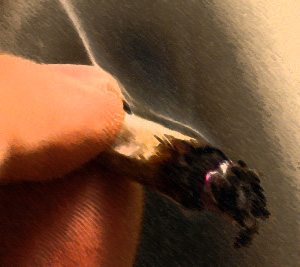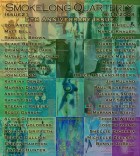For this issue, I contacted a couple of my biggest early influences in writing flash. One of those is W.P. Kinsella, whose “Alligator Report” was a revelation for me. In many ways, “Home Made” reminds me of the work in that book. You’ve been at this for quite a while now, and I’d argue that your tenure publishing flash online marks you as a godfather of the medium. Who were some of your earliest influences writing flash?
Kinsella’s book is on my bookshelf, too, but my bookshelf is in Eugene, Oregon, and I’m in London, so I can’t just look across the room to see what long-owned books will refresh my memory of earliest influences. I’m sure to leave some out.
When I was in college and collecting stacks of rejection slips for my poetry and fiction, I started translating, and found to my delight that I could earn a byline as a translator even when I couldn’t yet publish my own work. I was a very slow translator, though. Even in my best language, Spanish, I relied heavily on dictionaries, and when I translated from German, Portuguese, or French, I could spend all day in the library working on a single poem. And poetry was tricky, anyway. I favored prose, and I sought out short works. I translated from German and published (unauthorized!) an early story by Angela Sommer. I translated many stories by Salvador Elizondo and Mario Benedetti, publishing a few.
I would cite those writers as key early influences because I had to slow down in translation and pay attention to what they were doing one sentence at a time. I began to realize how much could be done with a very short story. Also, I was starting to give readings of my work and found that a reading of several very short stories worked better as performance than the reading of one longer story, even if the longer story was very good.
Another early influence was Russell Edson. He remains one of my favorites. His work is classified as poetry, but his pieces are prose narratives, and it was through his work that I started to understand how fluid the category designations can be.
Grace Paley. Richard Brautigan. Margaret Atwood. They all wrote these tiny gems of stories. And I loved traditional stories, too, which I found in ethnographic collections. Fairy tales. Legends. My first literary love was Ray Bradbury, and I often liked his shortest stories best.
I don’t think it’s much of a secret that, in general, I don’t care for flashes that can easily be classified as “genre.” But I’d classify this as sci-fi, and I love it, primarily because the humanity of the characters is more important than the inventions. What would you say to genre writers trying to cross over to literary venues? Or literary writers trying to cross over to genre venues?
First, I would argue that “Home Made” is not science fiction. Literary SF proceeds from one or more premises about something that is possible. We’re so awash in movie “sci-fi,” which is usually a fantasy dressed up in SF tropes, that most people don’t know that real science fiction is something different. (In fact, a lot of SF writers hate the term sci-fi and take it to mean movies, not a branch of literature.)
The premise of “Home Made” is an expressionistic one. The products in those boxes aren’t being proposed as something that really could exist. (Perhaps they could, but that would be a different story, one that focused more on the products and their consequences for their customers. The SF version could still focus on character, but I’d argue that for the story to be SF, those boxes would have to be opened and used, and the reader would have to be convinced that such a product could be produced.)
All of this fussiness that I’m exhibiting about definitions and categories is, in fact, answering your question. If a literary writer wants to experiment with genre, if a genre writer wants to reach a literary audience, my advice is to know both animals. It’s not necessary to conclusively answer “what is science fiction” in order to write it. SF critics have argued about definitions for decades. But it is important to have some sense of the particular pleasures of good SF, a good mystery, or a lyrical literary story that pleases its readers even without a plot or a clear resolution. To cross to the other side of the literary garden, you have to understand the aesthetics of what’s growing there. If you detect only superficial differences, you will write superficial imitations that will please almost no one.
In writing a piece like this, which idea comes first to you? The characters or the situation?
It varies. Stories start with an image that I build around, an ending that I want to arrive at (which often has to change by the time I have written my way there), a premise, a structure, a narrative stance.
In this case, the story was launched when I heard a program on BBC Radio Four about the changing ideals of sexuality. What sex is “supposed” to be changes. There are sexual fashions. The expert being interviewed said, “When was the last time you heard people talking about simultaneous orgasm?” I realized that when I was in my twenties, simultaneous orgasm was the ideal, and my girlfriend and I strove to achieve it.
Popular culture assigns us lots of ambitions like this, goals that may make us feel inadequate if we don’t achieve them. The truth is that the only standard for adequacy, in sex and much of life, is whether we and those we interact with are happy with our reality.
So the story is built on that observation, but there’s a more personal aspect of it, too, which is that in time, I am coming to terms increasingly with the world as it is, rather than as it is advertised. Things as they are. An enemy of enjoying what we have is the compulsion to want more or different.
You’ve become something of an ambassador for flash over the years, through teaching, public speaking, writing. What’s the one message you’d offer to someone unfamiliar with flash, to foster a relationship with the form?
Flash fiction is as varied as poetry or song. There’s as much variety in very short narratives as there is in all of literature. But as for fostering a relationship, I think that the most I want to do is say, “Here are some examples.” If the work can’t do its own dance of seduction, there’s nothing more I can do for it.
Since this issue marks our fifth anniverary, we’ve been thinking a lot about milestones, changes, growth… you’ve been publishing your work to subscribers on the web at shortshortshort.com since 2002, and publishing in online journals before that. What have been the big changes you’ve seen? Where do you see both flash and online publishing going in the future?
I see web sites proliferating, and flash fiction increasingly acknowledged as an ideal form for the web, but I also see a failure of most business plans involving online fiction. I’ve made a living, such as it is, from short fiction, by cobbling together many small checks here and there, but it’s getting harder and harder to do this as magazines shrink and paying web sites fail.
I’m not sure what the future holds, but short fiction is increasingly about as commercial as poetry, both on the web and in cold print. That makes the lives of writers harder, but they’ll no doubt keep writing anyway.
Perhaps we’ll see more ventures like my shortshortshort.com springing up, with writers surviving in part thanks to the direct patronage of readers. And maybe not. Maybe we’re headed for poetry’s situation, where everyone is an amateur and the only readers are other writers. But “amateur” isn’t a dirty word. It means doing something out of love. Most people who write, edit, and publish flash fiction are earning their rent money in some other way, and that’s generally how it goes for art. I think that increasingly even novels can pay the way of their creators only for either the exceptionally prolific or the exceptionally well-promoted, which won’t always mean the best writers of the best novels. But that doesn’t mean the death of literature. Poems and stories and novels get written and have readers.
Damon Knight said to me shortly before his death that he thought he had lived in a fortunate span of time in which it was possible to be a professional novelist. He doubted that, a few decades on, novelist would still be a profession. He thought it would again be an occupation for the obsessed, who wrote and published because they had to and earned money elsewhere, or the idle rich. That’s the situation in the early days of the novel. It may be what we return to.
I don’t know if Damon was right, but I do think that novelists have a harder and harder time. For writers of short stories, short-short stories, or poetry, the dollars come harder still. And yet no other writing is as satisfying to some of us, so we’ll go on even if people offer to pay us not to write.



 The core workshop of SmokeLong Fitness is all in writing, so you can take part from anywhere at anytime. We are excited about creating a supportive, consistent and structured environment for flash writers to work on their craft in a community. We are thrilled and proud to say that our workshop participants have won, placed, or been listed in every major flash competition. Community works.
The core workshop of SmokeLong Fitness is all in writing, so you can take part from anywhere at anytime. We are excited about creating a supportive, consistent and structured environment for flash writers to work on their craft in a community. We are thrilled and proud to say that our workshop participants have won, placed, or been listed in every major flash competition. Community works.